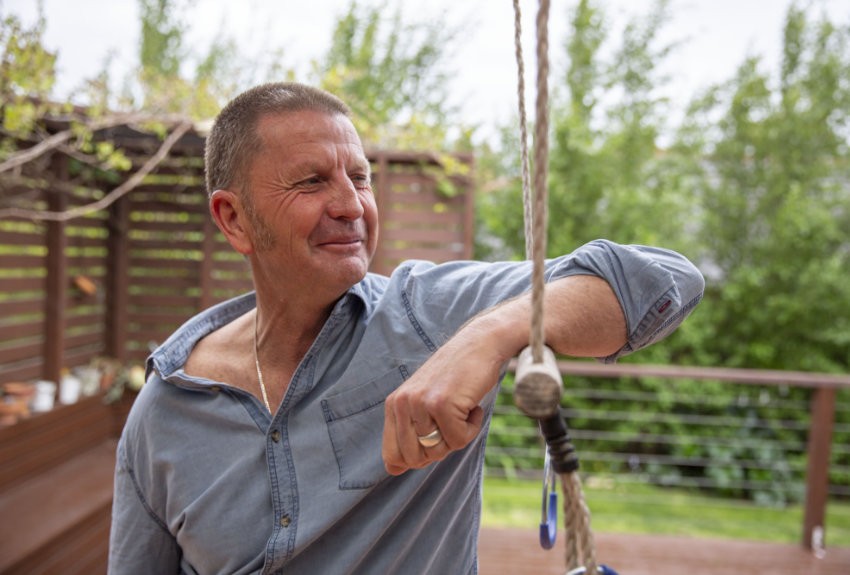The SANE Blog
Finding a way through your own bushfire recovery
Bushfire recovery is different for everyone. Finding a way back can take time, but there are green shoots on the other side.
Experiencing disaster takes a significant toll. The added pressure of being responsible for others – whether they’re family members, friends or people in your community – can make it really hard to find time and space for important self-care. But not doing it can have devastating effects.
Butch lives in Moss Vale, in the New South Wales Southern Highland area. In January 2020, a fire jumped a river and raced towards homes, sandwiching his town between two major blazes. Although he and his family were safe, Butch got a call asking if he would be part of an emergency response team in Batemans Bay.
When he arrived, the town was cloaked in smoke and lit by the red glow of flames.
Everyone has their own story
Butch lives with complex mental health issues. He was diagnosed with schizophrenia more than thirty years ago, after a traumatic event in his life.
This experience led him to become the Mental Health Commander at the Batemans Bay Rescue Centre. He knew he wanted to draw on his own life and use it to help others. So, as well as dealing with his own response to the fires, he listened to stories of loss, hopelessness, displacement and fear. All the energy he had left went into supporting his beloved community.
People wanted to talk about the anxiety, the fear. “They wanted to confide what had happened to them, what it was like,” he says. You might recognise some of his feelings from your own experiences: jumpiness, hearing noises, fatigue. It left him exhausted. “I was running on adrenaline.”
Shifting your focus can help
Being heavily involved took its toll on Butch. When he returned home, his family realised he would need gentle support as he processed what had happened. He would need his own space, but also connection with those who cared about him.
His recovery took him to an unexpected place. His family knew he loved to work with his hands, so they encouraged him to take on a new project, something that would hold his attention and help him to feel productive and motivated. He channelled his energy into gardening and building an “outback pub” in his backyard.
Now, he’s got a welcoming space that’s also a sanctuary. “I can go in there and relax,” he says. “I can go in there and breathe. I can go in there and reflect. But I can invite others to come in and share.”
We all need something different as we recover
Bushfire trauma can have a devastating impact, whether you’re on the frontlines like Butch or witnessing its effects on a loved one. Everyone who’s affected needs space and time to recover, and we all have different ways of finding it.
Butch’s hobbies were significant in his recovery, as they are for many people[1] [2] [3]. Reconnecting with the activities, communities or groups we love is part of a great self-care strategy. Everyone needs something different, but the benefits are the same: increased social connection, reduced stress levels and better-quality sleep.
Connecting with others and identifying what you need as you recover is crucial. After that, it’s about finding ways to bring them back into your life.
Finding positivity was hard, at first, but Butch wants others to realise it gets better. “Initially you’ll see nothing but the pain,” he says. “You’ll see the burnt trees. But you’ve got to recognise that pain first. When you look deeply, you see growing shoots, you see green grass, you see sunshine with no smoke.”
References
[1] https://bmcpublichealth.biomedcentral.com/articles/10.1186/s12889-015-2672-7
[2] https://headtohealth.gov.au/meaningful-life/purposeful-activity/hobbies
[3] https://www.tandfonline.com/doi/abs/10.1080/01490400.2015.1120168?journalCode=ulsc20
SANE provides a range of free telephone and online support services for people over 18 years of age with complex mental health needs and their family, friends and carers. We offer different types and levels of support so you can find what works for you. Choose from counselling, peer support, online groups and events, 24/7 community forums, and online information and resources. Learn more at sane.org/get-support.
When you subscribe to the blog, we will send you an e-mail when there are new updates on the site so you wouldn't miss them.
